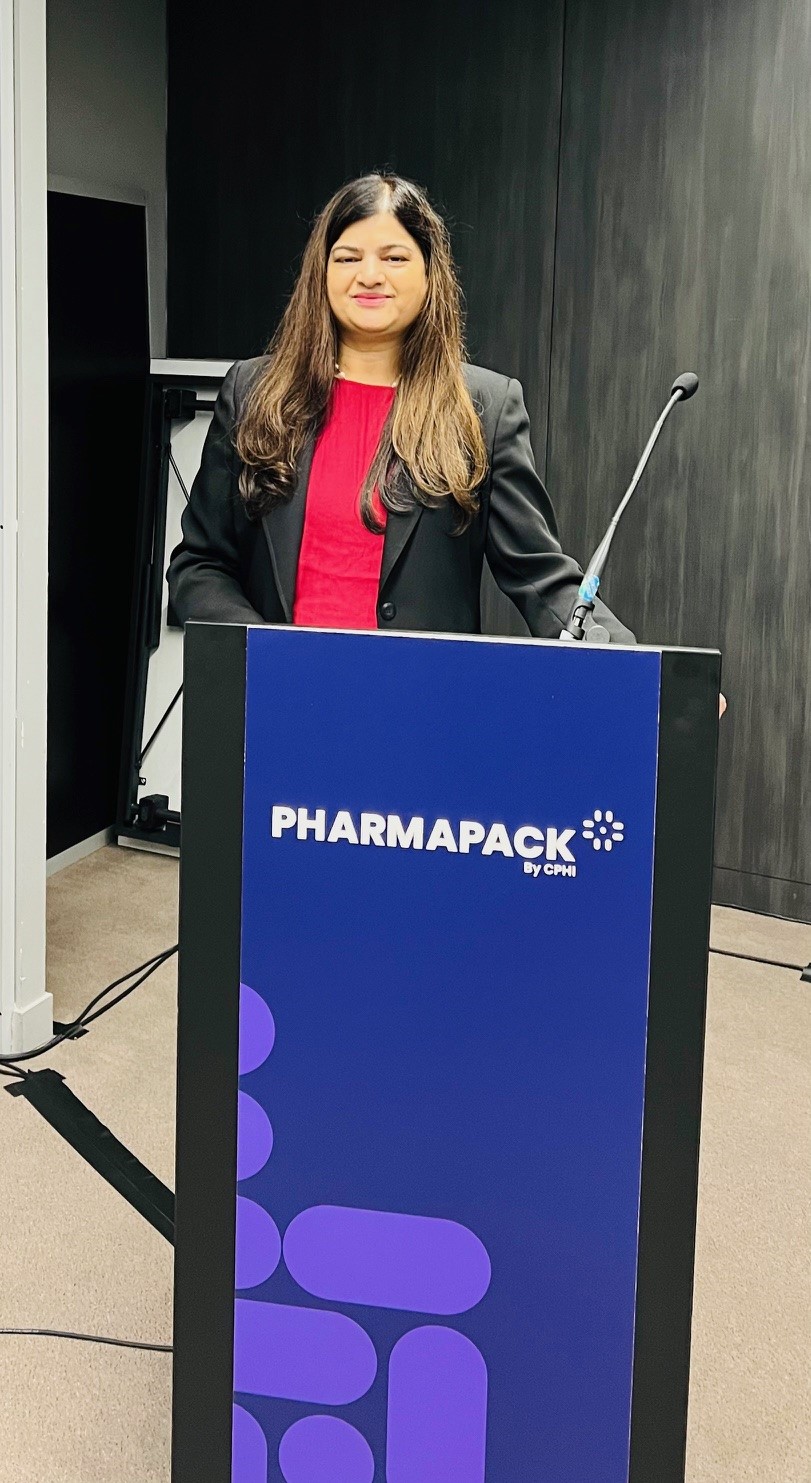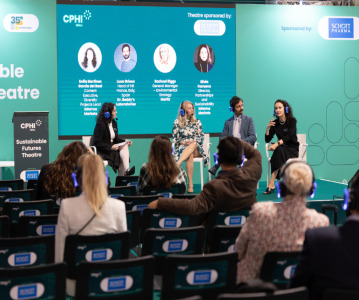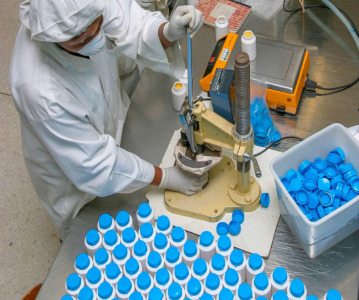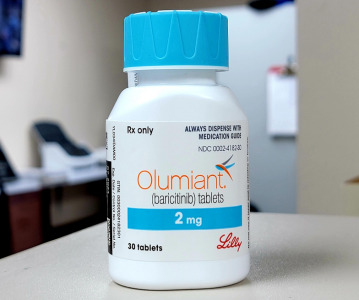Women in Pharma: Delivering personal and professional success
.png)
In our monthly series focusing on women in the pharmaceutical industry, we interview leading experts in the pharmaceutical supply and value chain to discuss the importance of gender diversity in healthcare, the workplace, and beyond.
In this month’s instalment, we sat down with Asmita Khanolkar, Senior Director, SMC Pharmaceutical Services at SMC Ltd., to explore her journey through the pharmaceutical industry as a drug delivery and combination products expert. We discover how she got into this sector of pharmaceuticals and the programmes and opportunities that are arising for women in this field.
1. Could you please introduce yourself and share some insights into your role?
I have been a part of the exciting healthcare industry for over 2 decades and have had the privilege to engineer, manage, and lead various novel medical products from concept to clinical and commercial launch. My product portfolio encompasses single-use, wearable on-body, implantable, drug-device, and device–biologic combination products covering various indications and fields, such as diabetes, pain management, immunotherapy, cell therapy, and tissue regeneration. I have held various engineering and management roles at leading medical device and pharmaceutical companies in New Product Development, Manufacturing Engineering, Operations, Advanced Quality Planning, and Supply Chain, including installation and commissioning of manufacturing lines and sites for novel therapeutic products. My current responsibilities include a corporate leadership role with SMC Ltd., working closely with the SMC global sites in early technical engagement through commercialisation for combination products, sterile manufacturing, and pharmaceutical services.
My education background is in engineering, a Master’s degree in Materials Science & Engineering from WPI in Massachusetts, USA and have completed professional training in Six Sigma Black Belt. I have authored multiple publications and co-authored the “Medical Device Validation Handbook”. My publications include ‘Novel Methods to Optimise Drug Delivery for Parenteral Products, Enabling Autoinjector Technologies for Drug Delivery’, ‘Accelerating Novel Therapies to Clinic’, ‘A new mindset for developing combination products’, ‘Patient-centric approach to device design’, and ‘Tissue modelling for injection delivery’. As an invited speaker, chair, and keynote presenter at various domestic and international pharmaceutical and medical device conferences, I have had many opportunities to share some of the insights from my learnings and collaborate with other industry professionals in various thought leadership presentations.
2. As a pharmaceutical professional in the drug devices and delivery sector, what are some of the most challenging aspects of your profession?
I feel there is a rising need for enabling drug delivery technology platforms that provide delivery solutions for novel therapies. On one hand, the novel therapies are continually becoming more complex with challenging delivery requirements, and on the other hand, decentralisation is moving the treatments from a hospital setting to home for patients to self-administer, making them simpler to use. There are also many unknowns around patient tolerability and bioavailability, with some of the newer therapies given in new administration sites, high concentrations, viscosities, and doses. This puts the onus on the device for precision delivery, successful clinical outcomes and therapeutic efficacy. With a focus on optimisation around the drug formulation behaviour, the delivery parameters, and the patient interface, we can develop technology solutions that can help this unmet need. Further on, the challenge remains to develop therapies faster to clinic. Our work continues in the field of optimising delivery with enabling technology solutions that can provide potential solutions for the technically challenging delivery needs for Biotherapies and Long-Acting Injectables. In addition, we continue to advance small batch manufacturing for therapies to bring speed-to-clinic with manufacturing readiness to scale, from preclinical through clinical to commercial launch.
3. You wrote a paper on the potential of long-acting injectables (LAIs) for improving patient compliance in those with chronic diseases. How much of a role does patient compliance play in the work that you do?
 Generally speaking, long-acting injectables provide better patient compliance and a better overall patient experience due to the reduced number of injections and spread over a longer time period. However, it is equally important as well to focus on long-term adherence and whether the patient remembers to take their injection regularly, and/or what the procedure is if the interval is longer. First and foremost, the best approach to solving this is making the device as simple and intuitive to use as possible, but this can also be supported by training the patient.
Generally speaking, long-acting injectables provide better patient compliance and a better overall patient experience due to the reduced number of injections and spread over a longer time period. However, it is equally important as well to focus on long-term adherence and whether the patient remembers to take their injection regularly, and/or what the procedure is if the interval is longer. First and foremost, the best approach to solving this is making the device as simple and intuitive to use as possible, but this can also be supported by training the patient.
Human factors studies including early patient engagement studies is a big part of our evaluation and the best patient experience is one of the key factors for success of a therapy. In our publication on Patient-Centricity, we talk about some of the nuances of the patient process mapping. This gives insights into the patients’ needs and activities in receiving the dose, the emotional and psychological state of mind related to the therapy, and any understandings of issues that may be barriers to adherence. Initial fieldwork, interviews, focus groups with patients, HCPs, living and work environments provide some of the touchpoints the patient interacts with their treatment and identifies any challenges they may be facing along the way.
Asmita Khanolkar (left)
4. How did you come to work in the drug delivery sector of pharmaceuticals? Did you ever feel like your gender aided/hindered your professional career?
My early projects were in the field of Diabetes and Diabetes Management, which involves high-volume manufacturing of drug delivery devices. Within diabetes, my journey fist started with delivery of insulin with single-use devices and then expanded to continuous subcutaneous insulin infusion (CSII) with on-body wearable for multiple-day devices for basal/bolus delivery in Type 2 Diabetic patients. From here, I had the opportunity to work in the advancing field of cell therapy as a curative solution for Type 1 Diabetes. I have seen the evolution of the Diabetes therapies’ involving insulin, GLP-1, and cell therapies. Today there is the introduction of Obesity drugs to add as well. This is how my journey started in the sector of drug delivery for pharmaceuticals in diabetes and has now expanded into various other indications.
I find the pharma/medical device fields provide great avenues for professional growth for all. When I first started in this field, it was not as diverse. In my times at college, there were no specific courses in biomedical, biotech, or bioengineering etc. To learn or train in these specific fields and techniques – it was all on-the-job training. However as the industry has evolved, all colleges offer biomedical engineering coursework. This seems to be an exciting field, especially for high school students looking to join scientific and technical roles within STEM. Recently, I was invited for a keynote at the Massachusetts Chapter of a high school program called ‘HOSA’ for future healthcare professionals. I spoke about real life solutions for ‘Applying Engineering to Healthcare and Medicine’ and witnessed great interest in this topic, especially since there is such a diversity of career offerings in this sector in addition to considering other traditional careers for future healthcare professionals.
5. How can the pharmaceutical industry be more mindful of gender diversity both in the work they do and in their respective workplaces?
I think there are two areas that could use some help in promoting diversity and add more women leading in the field. The first is related to increasing numbers of first women authors in scientific publications, IP, and patents. This number is fairly low at the moment. The second is entrepreneurship support in starting new device, biotech, and pharma companies.
6. Who are some of your Heroines of Pharma (women in the pharmaceutical industry you admire)?
I admire the women CEO’s of biotech/pharma companies. It is very insightful to read their stories, challenges, and approaches to problem solving. This list is growing and they serve as great role models for the next generation.
In addition, I want to acknowledge two other programs that I admire and have had the privilege to be a part of. Both of these programs are carving out paths to support inclusivity and providing resources to make an impact. The first one is the Massachusetts Next Generation Initiative, to support entrepreneurs with a more inclusive focus. This program provides great resources and support for underrepresented entrepreneurs to achieve successful start-ups.
The second is the American Association of Pharmaceutical Scientists (AAPS) Women in Pharmaceutical Research (WIPS). I had the privilege to be a part of this first special edition of Springer Journal of Pharmaceutical Sciences’ ‘Women in Pharmaceutical Research’, a collaboration of women first authored articles. It included a diversity of articles from formulation to drug delivery by women pharma scientists presenting original research.
Do you have a story to tell about diversity? If you’d be interested in being featured in our Women in Pharma series, please reach out to [email protected].
Related News
-
News Women in Pharma: Moving beyond discussions and into best practice at CPHI Milan
In this second CPHI Milan special of our monthly series, we cover the key takeaways from the Diversity & Wellbeing track held on October 10, 2024. -
News AstraZeneca invests in AI collaboration for cancer drug trials
The British-Swedish pharmaceutical giant is partnering with biotechnology firm Immunai Inc to increase the efficiency of some cancer drug trials. -
News Ozempic and Wegovy prices questioned as Novo Nordisk faces US Senate hearing
The CEO of Novo Nordisk was grilled during a US Senate committee hearing on September 24, 2024, in which the exorbitant prices of the Danish company’s blockbuster drugs Ozempic and Wegovy were called into question. -
News The BIOSECURE Act: implications for the pharma supply chain
On September 9, 2024, the US House of Representatives voted to pass the bill titled the BIOSECURE Act (the Act), which lists several Chinese companies in the pharmaceutical supply chain. The Act will prohibit American companies from contracting or doin... -
News On Track at CPHI Milan: Thermo Fisher Scientific Track Sponsor interview
With CPHI Milan just around the corner, we sat down with some of the sponsors for this year’s conference tracks to discuss the most pressing topics in pharma. -
News CPHI Milan Speaker Spotlight: Pharma Manufacturing and Localisation in Africa
In the run-up to CPHI Milan, we sit down with some of the experts and thought-leaders speaking at this year’s conferences. -
News US BIOSECURE Act passed by US House of Representatives
The controversial act, which has already impacted several foreign companies operating in the US, was passed by the House of Representatives on September 9, 2024. It is now headed for the US Senate before it can be signed into law by President Joe Biden... -
News Eli Lilly licenses rheumatoid arthritis manufacturing in Africa
American pharmaceutical company Eli Lilly has signed a partnership with Egyptian organisation Eva Pharma to localise manufacturing of rheumatoid arthritis treatments in Africa.
Position your company at the heart of the global Pharma industry with a CPHI Online membership
-
Your products and solutions visible to thousands of visitors within the largest Pharma marketplace
-
Generate high-quality, engaged leads for your business, all year round
-
Promote your business as the industry’s thought-leader by hosting your reports, brochures and videos within your profile
-
Your company’s profile boosted at all participating CPHI events
-
An easy-to-use platform with a detailed dashboard showing your leads and performance

.png)





